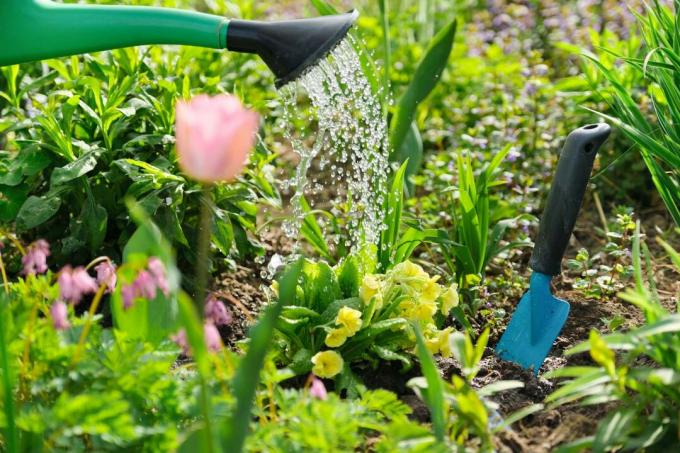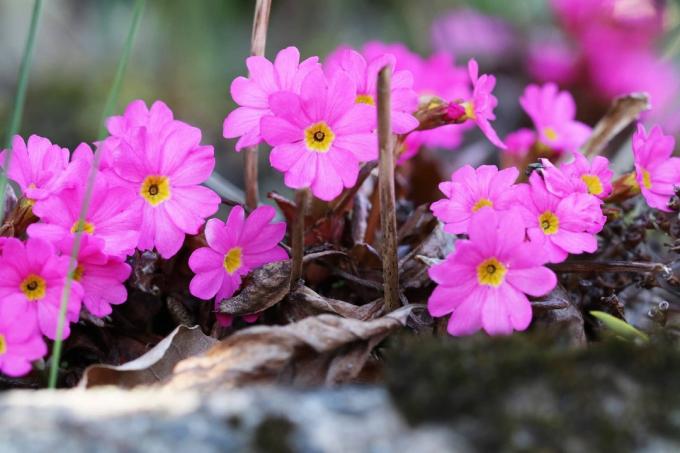
Do you also look forward to the colorful primroses every year? The robust early bloomer can be bought in pots everywhere as early as January. Read here what is important when watering primroses.
To the point
- Provide primroses with water regularly
- Water more during the flowering period and in sunny locations
- Provide permeable soil to avoid waterlogging
- Prefer low-lime water
- Water well again in autumn
Table of contents
- Primroses
- Water primroses correctly
- Note the differences between bedding and potted plants
- frequently asked Questions
Primroses
Primroses (Primula) are a large family of plants. There are not only red, blue, purple, white and yellow variants. The family includes low carpet primroses, long-stemmed floor primroses, bright yellow ones Cowslips, pretty rose primroses, magical orchid primroses and more. New, versatile varieties are constantly being bred that are suitable as ground cover Rock garden, Balcony box or room feel comfortable.

The perennial flowering plant is considered robust, but it doesn't work without care.
She needed
- nutrient-rich soil
- sunny or partially shaded location
- moist substrate
Water primroses correctly
How often?
Check the substrate of primroses in the pot regularly. Water when dry. The substrate should never dry out completely.
Tip: Keep primroses as houseplants, spray leaves and stems with water at regular intervals, to increase the humidity.
When?

It is best to water primroses in the morning. Then the leaves have a chance to dry well during the day. Wet foliage is susceptible to disease. Water during flowering and again starting in the fall.
By which?
Use lukewarm low-lime irrigation water. Under no circumstances should the water be too cold. Outdoor plants prefer rainwater.
Tip: Combine watering indoors with fertilizing and add some liquid fertilizer to the water.
Note the differences between bedding and potted plants
Primroses in pots need regular watering. They dry out quickly. Outdoors, only freshly planted plants and primroses on sandy soils need to be watered more frequently. Adult specimens do well in normal weather without watering. However, in periods of long drought, outdoor primroses should also be watered additionally.

The rose primrose can even be moist pond edges grow. Everyone else doesn't like waterlogging. They feel really comfortable in moist soil.
A notice: Remove excess water from the saucer.
frequently asked Questions
Remove spent flowers regularly. This stimulates flower formation and you can enjoy its beauty for a long time.
The varieties that are sold commercially are usually hardy. Some even bloom in sub-zero temperatures and as long as the ground is not frozen they can be planted. However, primroses in pots should be moved to a frost-proof place below minus five degrees Celsius. You can protect outdoor primroses with moss or brushwood in severe frosts.
The most common reason for the weakening of the otherwise robust plant is errors in the water supply. Both drought and waterlogging cause death. In the wrong location with too little light or direct sunlight, the primrose's vigor quickly diminishes.
Potted primroses are susceptible to diseases such as powdery mildew. It is therefore important to let the leaves dry well. The age of the plant is also crucial. Annual primroses die after a period of flowering.
Yes, depending on the variety, primroses can bloom several times a year. Remove spent flowers regularly. This stimulates flower formation. In a suitable location and with good care, primroses produce flowers again after a period of rest.



